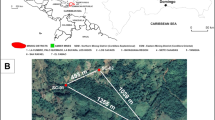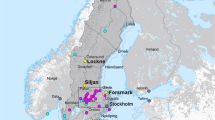Abstract
A DETAILED investigation of Lower Triassic mud and core samples from north-west German oil wells which I have carried out has revealed the presence of cosmic spherules in considerable numbers. Although magnetic and vitreous spherules originate also from various industrial processes, there seems to be little doubt that the spherules referred to represent genuine cosmic matter, as their main components are magnetite and an iron–magnesium silicate (olivine or bronzite). Thus they have the same composition as the Sikhote-Alin spherules extracted from the soil after the fall of that meteorite. Spherules from deep-sea sediments show the same composition.
This is a preview of subscription content, access via your institution
Access options
Subscribe to this journal
Receive 51 print issues and online access
$199.00 per year
only $3.90 per issue
Buy this article
- Purchase on Springer Link
- Instant access to full article PDF
Prices may be subject to local taxes which are calculated during checkout
Similar content being viewed by others
References
Dingle, H., and Pettersson, H., Nature, 191, 482 (1961).
Author information
Authors and Affiliations
Rights and permissions
About this article
Cite this article
UTECH, K. Frequency of Meteorite Falls throughout the Ages. Nature 193, 56–57 (1962). https://doi.org/10.1038/193056b0
Issue Date:
DOI: https://doi.org/10.1038/193056b0
This article is cited by
-
Spektralanalyse sehr kleiner meteoritischer K�gelchen
Beitr�ge zur Mineralogie und Petrographie (1964)
Comments
By submitting a comment you agree to abide by our Terms and Community Guidelines. If you find something abusive or that does not comply with our terms or guidelines please flag it as inappropriate.



